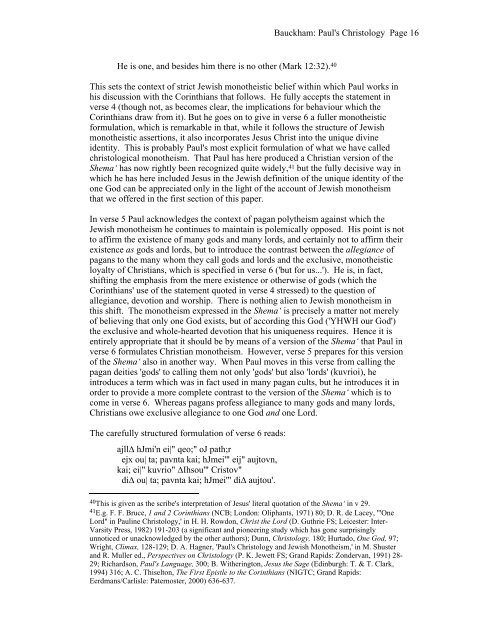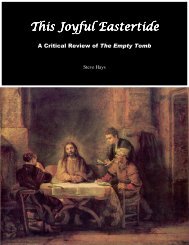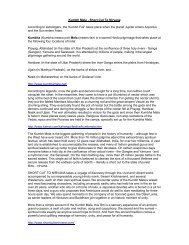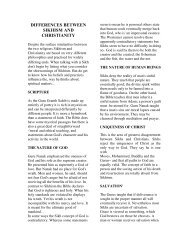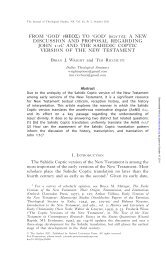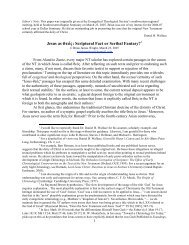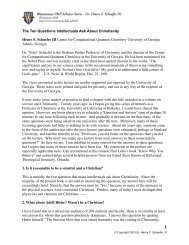Paul's Christology of Divine Identity © Richard ... - For an Answer
Paul's Christology of Divine Identity © Richard ... - For an Answer
Paul's Christology of Divine Identity © Richard ... - For an Answer
You also want an ePaper? Increase the reach of your titles
YUMPU automatically turns print PDFs into web optimized ePapers that Google loves.
Bauckham: <strong>Paul's</strong> <strong>Christology</strong> Page 16<br />
He is one, <strong>an</strong>d besides him there is no other (Mark 12:32). 40<br />
This sets the context <strong>of</strong> strict Jewish monotheistic belief within which Paul works in<br />
his discussion with the Corinthi<strong>an</strong>s that follows. He fully accepts the statement in<br />
verse 4 (though not, as becomes clear, the implications for behaviour which the<br />
Corinthi<strong>an</strong>s draw from it). But he goes on to give in verse 6 a fuller monotheistic<br />
formulation, which is remarkable in that, while it follows the structure <strong>of</strong> Jewish<br />
monotheistic assertions, it also incorporates Jesus Christ into the unique divine<br />
identity. This is probably <strong>Paul's</strong> most explicit formulation <strong>of</strong> what we have called<br />
christological monotheism. That Paul has here produced a Christi<strong>an</strong> version <strong>of</strong> the<br />
Shema‘ has now rightly been recognized quite widely, 41 but the fully decisive way in<br />
which he has here included Jesus in the Jewish definition <strong>of</strong> the unique identity <strong>of</strong> the<br />
one God c<strong>an</strong> be appreciated only in the light <strong>of</strong> the account <strong>of</strong> Jewish monotheism<br />
that we <strong>of</strong>fered in the first section <strong>of</strong> this paper.<br />
In verse 5 Paul acknowledges the context <strong>of</strong> pag<strong>an</strong> polytheism against which the<br />
Jewish monotheism he continues to maintain is polemically opposed. His point is not<br />
to affirm the existence <strong>of</strong> m<strong>an</strong>y gods <strong>an</strong>d m<strong>an</strong>y lords, <strong>an</strong>d certainly not to affirm their<br />
existence as gods <strong>an</strong>d lords, but to introduce the contrast between the allegi<strong>an</strong>ce <strong>of</strong><br />
pag<strong>an</strong>s to the m<strong>an</strong>y whom they call gods <strong>an</strong>d lords <strong>an</strong>d the exclusive, monotheistic<br />
loyalty <strong>of</strong> Christi<strong>an</strong>s, which is specified in verse 6 ('but for us...'). He is, in fact,<br />
shifting the emphasis from the mere existence or otherwise <strong>of</strong> gods (which the<br />
Corinthi<strong>an</strong>s' use <strong>of</strong> the statement quoted in verse 4 stressed) to the question <strong>of</strong><br />
allegi<strong>an</strong>ce, devotion <strong>an</strong>d worship. There is nothing alien to Jewish monotheism in<br />
this shift. The monotheism expressed in the Shema‘ is precisely a matter not merely<br />
<strong>of</strong> believing that only one God exists, but <strong>of</strong> according this God ('YHWH our God')<br />
the exclusive <strong>an</strong>d whole-hearted devotion that his uniqueness requires. Hence it is<br />
entirely appropriate that it should be by me<strong>an</strong>s <strong>of</strong> a version <strong>of</strong> the Shema‘ that Paul in<br />
verse 6 formulates Christi<strong>an</strong> monotheism. However, verse 5 prepares for this version<br />
<strong>of</strong> the Shema‘ also in <strong>an</strong>other way. When Paul moves in this verse from calling the<br />
pag<strong>an</strong> deities 'gods' to calling them not only 'gods' but also 'lords' (kuvrioi), he<br />
introduces a term which was in fact used in m<strong>an</strong>y pag<strong>an</strong> cults, but he introduces it in<br />
order to provide a more complete contrast to the version <strong>of</strong> the Shema‘ which is to<br />
come in verse 6. Whereas pag<strong>an</strong>s pr<strong>of</strong>ess allegi<strong>an</strong>ce to m<strong>an</strong>y gods <strong>an</strong>d m<strong>an</strong>y lords,<br />
Christi<strong>an</strong>s owe exclusive allegi<strong>an</strong>ce to one God <strong>an</strong>d one Lord.<br />
The carefully structured formulation <strong>of</strong> verse 6 reads:<br />
ajll∆ hJmi'n ei|" qeo;" oJ path;r<br />
ejx ou| ta; pavnta kai; hJmei'" eij" aujtovn,<br />
kai; ei|" kuvrio" ∆Ihsou'" Cristov"<br />
di∆ ou| ta; pavnta kai; hJmei'" di∆ aujtou'.<br />
40 This is given as the scribe's interpretation <strong>of</strong> Jesus' literal quotation <strong>of</strong> the Shema‘ in v 29.<br />
41 E.g. F. F. Bruce, 1 <strong>an</strong>d 2 Corinthi<strong>an</strong>s (NCB; London: Oliph<strong>an</strong>ts, 1971) 80; D. R. de Lacey, '"One<br />
Lord" in Pauline <strong>Christology</strong>,' in H. H. Rowdon, Christ the Lord (D. Guthrie FS; Leicester: Inter-<br />
Varsity Press, 1982) 191-203 (a signific<strong>an</strong>t <strong>an</strong>d pioneering study which has gone surprisingly<br />
unnoticed or unacknowledged by the other authors); Dunn, <strong>Christology</strong>, 180; Hurtado, One God, 97;<br />
Wright, Climax, 128-129; D. A. Hagner, '<strong>Paul's</strong> <strong>Christology</strong> <strong>an</strong>d Jewish Monotheism,' in M. Shuster<br />
<strong>an</strong>d R. Muller ed., Perspectives on <strong>Christology</strong> (P. K. Jewett FS; Gr<strong>an</strong>d Rapids: Zonderv<strong>an</strong>, 1991) 28-<br />
29; <strong>Richard</strong>son, <strong>Paul's</strong> L<strong>an</strong>guage, 300; B. Witherington, Jesus the Sage (Edinburgh: T. & T. Clark,<br />
1994) 316; A. C. Thiselton, The First Epistle to the Corinthi<strong>an</strong>s (NIGTC; Gr<strong>an</strong>d Rapids:<br />
Eerdm<strong>an</strong>s/Carlisle: Paternoster, 2000) 636-637.


